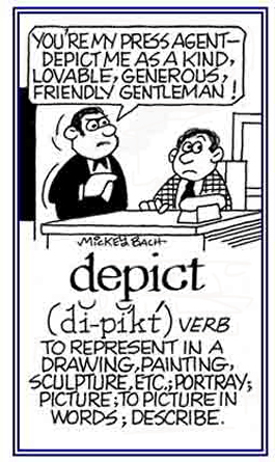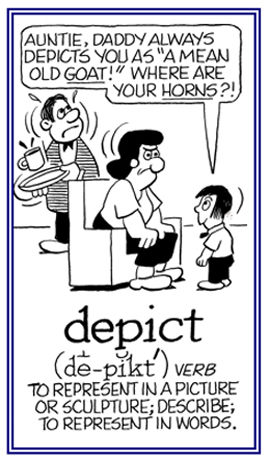pict-, paint-
(Latin: paint, painting; picture)
This unit of "paint" words is directly related to the pigment- family of words.
depict (verb) depicts; depicted depicting
1. To represent by or as if by a drawing or a sculpture; to portray: The wall of Jake's living room wall was painted with a large mural that depicted famous scenes about animals of nature.
2. To characterize in words; to describe: Mildred was very interested in the way the author of the book depicts the characters in his novel.

© ALL rights are reserved.

© ALL rights are reserved.
Go to this Word A Day Revisited Index
2. To characterize in words; to describe: Mildred was very interested in the way the author of the book depicts the characters in his novel.
Some people are convinced that the egocentric politician depicts himself as a know-it-all; even though he flip-flops from one position to another one.


Go to this Word A Day Revisited Index
so you can see more of Mickey Bach's cartoons.
depicted (adjective), more depicted, most depicted
Relating to having been represented graphically by sketch or design or lines.
depicter
1. Someone who represents something in a picture or sculpture.
2. A person who represents anything in words or who presents descriptions.
2. A person who represents anything in words or who presents descriptions.
depiction
1. The representation of showing something in a picture or story: "The writer's depictions of the horrors of war helped to bring realism to what has been accepted as fiction." "I am fed up with the depiction of sex in motion pictures."
2. A lifelike image of something, either verbal or visual.
3. A drawing or painting.
4. A drawing of the outlines of forms or objects.
2. A lifelike image of something, either verbal or visual.
3. A drawing or painting.
4. A drawing of the outlines of forms or objects.
depicture
To make a picture of; such as, to paint, to picture, or to depict.
impictured
Painted; impressed.
orpiment
1. A bright yellow arsenic sulfide mineral used in dyeing or tanning.
2. Etymology: from Middle English, previously from Old French, and before from Latin auripigmentum, from aurum, "gold" + pigmentum, "pigment".
2. Etymology: from Middle English, previously from Old French, and before from Latin auripigmentum, from aurum, "gold" + pigmentum, "pigment".
orpin, orpine
A plant with yellow flowers.
paint
1. A colored liquid applied to a surface in order to decorate or protect it, or in order to create a painting.
2. To cover the surface of something with paint in order to decorate or to protect it.
3. To mark designs or words on a surface using paint.
4. To apply makeup to the face or lips, or polish to the nails.
5. Etymology: "implied in painting" or a "result of applying paint"; from Old French peinter, from peint, past participle of peindre, "to paint"; from Latin pingere, "to paint".
2. To cover the surface of something with paint in order to decorate or to protect it.
3. To mark designs or words on a surface using paint.
4. To apply makeup to the face or lips, or polish to the nails.
5. Etymology: "implied in painting" or a "result of applying paint"; from Old French peinter, from peint, past participle of peindre, "to paint"; from Latin pingere, "to paint".
painter
1. An artist who paints pictures.
2. A person who coats walls or other surfaces with paint; especially, to paint the interiors of buildings as an occupation.
2. A person who coats walls or other surfaces with paint; especially, to paint the interiors of buildings as an occupation.
painting
1. A specific picture done by a painter.
2. The field of art represented by painters.
3. The act or occupation of covering building surfaces with paint.
2. The field of art represented by painters.
3. The act or occupation of covering building surfaces with paint.
Pict
1. A member of an ancient people of uncertain origin who inhabited parts of northern Britain, fought against the Romans, and in the 9th century A.D. united with the Scots to form a kingdom later to become known as Scotland.
2. Etymologically, the "painted" or "tattooed" people.
3. An ancient people of Great Britain, from Late Latin Picti (late third century, probably a nickname given to them by Roman soldiers), usually taken as derived from picti "painted", but probably from the Celtic name of the tribe, perhaps Pehta, Peihta; literally, "the fighters". They painted and tattooed themselves, which may have suggested a Roman folk-etymology alteration of the name. The Old English name for the people was Peohtas.
2. Etymologically, the "painted" or "tattooed" people.
3. An ancient people of Great Britain, from Late Latin Picti (late third century, probably a nickname given to them by Roman soldiers), usually taken as derived from picti "painted", but probably from the Celtic name of the tribe, perhaps Pehta, Peihta; literally, "the fighters". They painted and tattooed themselves, which may have suggested a Roman folk-etymology alteration of the name. The Old English name for the people was Peohtas.
Pictish
1. Of or relating to the Picts or their language or culture.
2. The language of the Picts, of uncertain affiliation, known chiefly from place names and extinct by the tenth century.
2. The language of the Picts, of uncertain affiliation, known chiefly from place names and extinct by the tenth century.
pictogram
1. Images representing things or ideas rather than words.
2. A symbol which is a picture that represents an object or concept; such as, a picture of an envelope used to represent an e-mail message.
2. A symbol which is a picture that represents an object or concept; such as, a picture of an envelope used to represent an e-mail message.
Pictograms are common in everyday life; such as, signs in public places or roads; whereas the term icon is specific to interfaces on computers or other electronic devices.
pictographic
Consisting of, or characterized by, the use of pictographs; "a pictographic script"; "pictographic stage in the development of writing".

